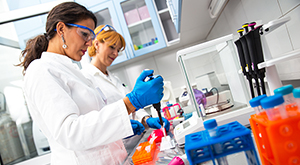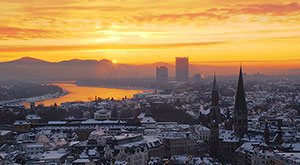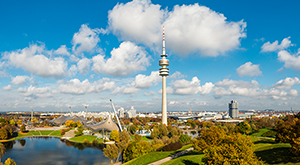Case Study: British Astrophysics Researcher living in Garching
Dr Patricia Schady is a British astrophysics researcher at the Max-Planck-Institut für extraterrestrische Physik (MPE), in Garching, Munich. She has been working within the high energy group since October 2009, predominantly on gamma-ray burst (GRB) research, and within the GROND team. Dr Schady’s research interests include GRBs and their host galaxies, stellar and galaxy evolution, GRB and QSO-DLAs, and properties of the ISM at high-z.
In December 2012 she was awarded a 5-year Alexander von Humboldt Sofja Kovalewskaja Award to build up her own research group to investigate the properties of GRB host galaxies and their relation to other star forming galaxy populations. Currently the group is made up of Dr Schady, two PhD students and four postdocs.
1. Dr Schady – thank you for taking the time to talk to us. Can you tell us a little about your current research position?
I’m a research group leader with two (and a half) PhD students and four postdocs under my supervision. My position is for 5 years and is due to end in mid-2018. The research carried out within my group is related to stellar explosions and galaxy evolution, with a particular focus on the properties of the host galaxies of gamma-ray bursts and superluminous-supernovae; two of the most powerful explosions since the Big Bang.
My position involves pursuing my own research (observations, data analysis and publications), supervising the work of my students and postdocs, and planning future projects for the group.
2. How did you come to be working and in Germany?
I came to work in Germany as a postdoc for an initial 2-year position, which later got extended until I was awarded my research group leader position.
3. How easy was it to find a postdoctoral position in Germany?
I didn’t explicitly look for a position in Germany. I saw a postdoc position that interested me and it happened to be in Germany. The application for the postdoc position itself was fairly easy. I just had to provide my CV, list of publications and a summary of my research interests, as well as 2-3 letters of recommendation.
4. What was the application process like?
The position that I currently have is funded by the Sofja Kovalevskaja Award, provided by the Alexander von Humboldt Foundation. The application was fairly lengthy, but no more than other 5-year funding applications that I am aware of. I had to provide a 25-page research proposal, in addition to a standard application, my CV, publications list, and letters of recommendation.
5. How accessible is funding for postdoctoral studies/researchers or other academic positions in Germany?
My impression is that Germany has the most research funding opportunities of any country in Europe. Apart from the EU funding opportunities available to any country within the EU, Germany also offers several funding opportunities though the DFG, the DLR, the Heisenberg programmes, and the Alexander von Humboldt Foundation. There are more, but those are the ones that I have come across during my time here in Germany.
6. What is the best thing about working and living in Germany as a postdoc?
I work in Munich at one of the largest astronomy research campuses in the world, and thus that naturally affects my opinion of how it is to work in Germany. It is possible that I would have a different opinion if I worked elsewhere in Germany. Nevertheless, my experience is wholly positive. There is a very large international community with researchers from all over the world, and overall I have had a good experience of working with my German and international colleagues. Politics sometimes plays a role in my work, but I think that applies everywhere. Germany can have the reputation of having a very hierarchical working environment, and I have heard such stories. However, my personal experience has not been this – I have always felt that there has been a very fair and even working relationship within my department.
7. Did you find language a barrier to your activities in Germany?
Not at all. As far as work is concerned, there is no need to speak German, and no-one begrudges you if you don’t speak German. However, outside of work that is another matter. Many people speak English and there is no real need to speak German. Nevertheless, to be able to integrate, speaking the language is clearly preferable.
8. What tips would you give potential junior researchers or postdocs who wish to continue their studies or work in Germany?
I would advise young researchers to look into the opportunities offered by the Alexander von Humboldt Foundation. They are predominantly interested in attracting high rating postdocs from outside Germany to carry out research within Germany, and offer many funding opportunities, from 2-year fellowships, to 5-year project leader positions.
Max Saved Jobs Reached
A maximum of 500 Saved Jobs can be created against your account. Please remove an existing Saved Job in order to add a new Saved Job.
Manage Saved Jobs









